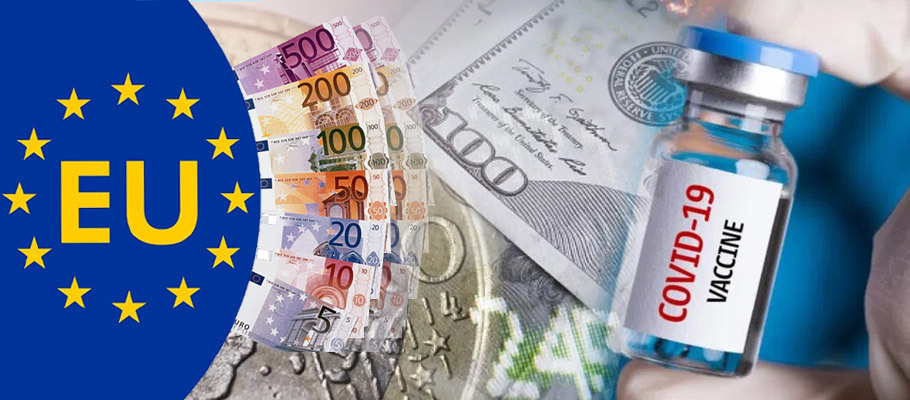
Published: July 25th, 2020
The euro was on the up this week, opening on a four-month high against the greenback as traders reacted to positive news from the European Union summit on an end to the stalemate over the bloc’s COVID-19 bailout programme.
News of agreement on a deal pushed the euro to a four-month high of $1.1470 against the dollar before profit-taking drew it back.
After four days of fraught negotiations, where EU chiefs hadn’t been able to agree on how to structure the region’s proposed recovery fund, agreement was reached on a deal in excess of 750 billion euros.
The region’s North-South divide has been clearly on display in the talks, with countries like Germany and the Netherlands reluctant to offer economically weaker countries – mainly on the Mediterranean – the benefits of pooling debt across member states.
Austrian Chancellor Sebastian Kurz tweeted that ‘We can be delighted with today's result. The hard part of these negotiations has come to an end.’
Along with Denmark, Sweden, and the Netherlands, Austria had been one of four EU governments foot-dragging over the deal, concerned, they said, about how the funds will be used and measures for monitoring compliance.
The deal announced on Tuesday means the holdouts are happy with provisions that will make 390 billion euros of the fund available as grants, with the rest offered as low-interest loans.
FX strategists at Nordea tweeted that ‘The hardliners have realised that grants will need to be a regular component of the package going forward. Regular transfers of cash from North to the South will be required if they want a well-functioning euro.’
The dollar’s safe-haven role through much of the coronavirus crisis hasn’t enabled it to benefit in recent days. It’s struggled to post gains despite the number of COVID-19 infections crossing the 14.5 million mark, and a global death toll exceeding 600,000.
In the US the virus has killed more than 140,000 people, and experts say the country still hasn't taken sufficient measures to get the outbreak under control. Recently ‘re-opened’ Florida announced over 12,000 new cases this week, while Los Angeles appears ready to implement new lockdown measures.
With some COVID stimulus policies due to expire this month, those dire numbers will spur America’s policymakers to find new ways to stimulate state and national economies.
European equity market futures and shares in Asian companies also made gains this week on news of the EU stimulus deal being agreed.
Another critical factor uplifting markets has been renewed hope that COVID-19 vaccines might be ready by the end of the year. Positive data from trials of three prospective coronavirus vaccines, including one high-profile option being trialled at Oxford University, also supported sentiment and riskier assets.
Oxford University announced this week that its early-stage human trials for ChAdOx1 nCoV-19, developed in partnership with pharmaceutical giant AstraZeneca, had demonstrated positive results. Two other possible vaccines also returned positive data this week, including one being developed by China’s military research unit in partnership with CanSino Biologics.
The EU’s massive stimulus deal, based on a 750 billion euro recovery fund, is seen by many analysts as essential to the bloc’s future.
The risk-on approach seen in global markets over the last few months has happened mainly off the back of state intervention, supported by record levels of stimulus designed to soften the economic blow of the COVID-19 pandemic and extensive lockdown measures to control its spread.
But many analysts believe the rally isn’t sustainable, and the upswing in market mood will face several reality checks starting in late July when corporate earnings season kicks off around the globe. Some of these results could shock markets back to attention.
Analysts at Jupiter Asset Management in London wrote on Tuesday that the global economy is still struggling to cope under stresses that exceed those seen during the 2008/09 financial crisis.
Quantitative easing has an ‘anaesthetic’ impact on markets, they said, but that participants may have been numbed to the depth of the crisis as a result. The likely longer-term effects of lockdown on corporate earnings and unemployment are being under-weighted in forecasts.
With the news of the EU summit breakthrough still keeping world markets buoyant, investors have shifted their gaze to the potential for further stimulus measures from the US government to re-energise the economy, following $3 trillion in stimulus measures already undertaken since February.
Policymakers are expected to announce new stimulus measures before the end of July, with market watchers estimating an additional one to 1.5 trillion USD being injected into the economy.
A battle is underway however Democrats and Republicans pushed for their own respective agendas. Republicans want to cap any upcoming coronavirus aid at no more than $1 trillion. Democrats have said they’ll push for much more – closer to $3 trillion in new stimulus.
Late in the week, the greenback slumped to its lowest in nearly two years, as investors continued to sell dollars on fears a surge in coronavirus cases will make it impossible for the American economy to rebound in the near-term.
In contrast, the euro rose again, hitting the highest level seen since October 2018 when it crossed the technically significant $1.16 level. At week's end, it was up for a fifth consecutive day against the dollar – enjoying continued warm sentiment from investors following agreement on the EU’s joint recovery fund.
In currency markets, the yuan remained mostly un-moved this week, with simmering tensions between Beijing and Washington undermining any potential gains from capital inflows into the mainland stock market.
Oil prices also held firm, closed within the narrow trading band seen across the previous three weeks as investors measured prospects for a recovery in oil demand, balanced with worries about new lockdown measures thanks to a resurgence in coronavirus cases.